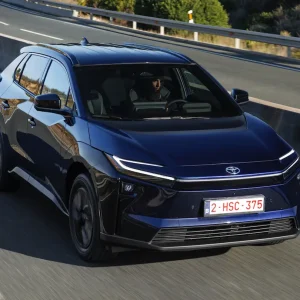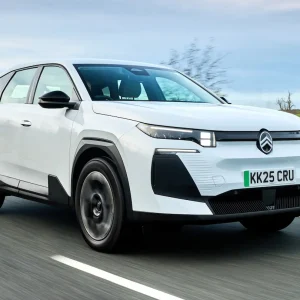We’ve heard the arguments about hybrids and whether they’re the future of propulsion, an interim measure before hydrogen fuel cells save the planet, or just a complete waste of time.
Faced with such a disparate range of opinion, there was only way to find out the truth about hybrids, and that was to live with one every day. Hence the Lexus RX400h’s place on our long-term fleet for the past six months.
We plumped for the range-topping SE-L trim to engage in the full luxury big 4×4 experience. Although the cheapest hybrid RX comes in at almost £10,000 under our car’s £45,040 P11D, our car was fully-stocked with every conceivable gadget including satnav [1], leather upholstery, rear parking camera and powered tailgate.
Powered by a 3.3-litre six-cylinder petrol engine combined with an electric motor that recharges itself by taking otherwise wasted energy under deceleration or braking, the hybrid is designed for city living. At low speed, up to about 30mph, it can run solely on electric power, perfect for an urban commute like mine where I’ll rarely average more than 8mph for the 45mins I’m in the car. The RX’s display shows you a graph of average economy over the previous five minutes, so it almost becomes a game to keep the bar high.
Predictably, given Lexus’ bulletproof reliability reputation, the car ran faultlessly for its 10,000 miles in our care. In fact, the only time we had to go near a dealer was for the 10,000 mile service, a couple of weeks before it went back. An oil change and check-over later, we’d signed a credit card receipt for a shade under £200 and were away [2].
We managed an average 26.5mpg, which is significantly better than a big petrol off-roader would manage, and probably ahead of a diesel such as BMW’s X5 3.0d, especially in town, where we were edging up towards 30mpg thanks to the amount of time spent running on the electric motor. But it’s at higher speed, where the electric motor does nothing more than add weight, that the case for hybrids is less strong. A high-speed run across the continent returned 18.6mpg [3], and scrolling down the list of returned mpg by tank, it’s easy to pick out the ones that were out of town. It’s a reverse of the norm, where longer runs would normal return better consumption.
It’s a question of swings and roundabouts as to whether one makes the decision to opt for a Lexus RX400h. For example, the high P11D is partially offset by the spectacularly low CO2 emissions; with the additional 2% hybrid discount, the RX400h is hit by just 23% BIK, compared with the maximum 35% for any BMW X5.
Lease rates are a problem, though, hovering north of £900, which is considerably more than the X5 or Volvo XC90. That’s down to a worry over the appeal of the technology to used buyers three years down the line (according to HSBC the lease rate has actually risen by £14 since the car joined us earlier this year). However, anyone heading into London’s congestion charge zone will recoup £8 per day because of the vehicle’s hybrid exemption [4] – especially handy when the scheme controversially expands west next February. Like I said, it’s all swings and roundabouts.
There’s no denying the RX400h is a quality piece of kit, and the technology is a welcome development, given Lexus’ lack of a diesel option. The car’s well equipped, refined, spacious and effortless to own. The decision to buy one over any of its petrol or diesel counterparts just comes down to whether the type of driving it’s used for will play to the hybrid’s strengths. With us it certainly did.





